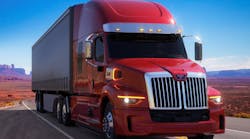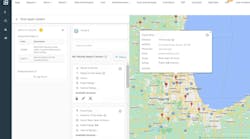Most fleets understand that keeping their truck tires properly inflated can improve tire life, fuel economy and overall vehicle safety. The problem is that checking tire pressure is one of the more tedious and time-consuming tasks in the trucking industry today. However, ignoring tire pressure checks can be hazardous to a fleet's health.
A study by Doran Mfg. found that more than half of all commercial truck tires were under-inflated. “Only 46% of tractor tires and 38% of trailer tires are within 5 psi of [proper] pressure. So it's not surprising that 90% of tire failures are caused by under-inflation.”
Research from ArvinMeritor, which has a partnership with P.S.I. to build tire inflation systems, demonstrates that more than 80% of fleet tire problems are caused by improper inflation.
Lax tire pressure monitoring can have a number of negative consequences. According to Doran, fuel mileage decreases 0.1% for every 1 psi of under-inflation, and the average tire is under-inflated by 15 psi by the time it is serviced. Doran also notes that tire life is cut by 1.78% for every 1 psi of under-inflation.
The Reineke Co. (PressureGuard) says a TMC study found that the average fleet loses at least $750 per tractor-trailer annually because of under-inflated tires. Furthermore, fleets with constant under-inflation situations required 12% more new tires and 10% more retreads, and achieved 0.6% poorer fuel economy, than fleets that maintained tire pressure.
Today, however, fleets can choose from a wide array of systems that monitor tire pressure and in some cases automatically inflate tires to the proper pressure.
Dale Lane, director of sales for Airgo Systems, points out that this technology can save fleets some serious money if used properly. “If you equipped 46,000 trailers with tire monitoring and inflation systems, you'd save $2-million a year in fuel costs alone,” he notes. “But the reality is that every fleet is different, so it's hard to generalize the return on investment (ROI)” from one fleet to the next.
Doran developed a quick ROI chart for fleets based on total tractor-trailer tire configuration and number of miles driven per year, as well as savings related to extended tire life, improved retread ability, and reduced road service calls for blowouts.
According to Doran's calculations, a tire monitoring and inflation system installed on an 18-wheeler running 100,000 miles a year will pay for itself in nine months. Doran says the system will save $1,756 a year per tractor-trailer.
“The secret is to go beyond just monitoring tire pressure [and be able] to automatically correct under-inflation,” says Airgo's Lane. “Knowing when a tire is under-inflated is good, but a driver is not always able to stop immediately to correct the problem. That's why automatic inflation is such a benefit.”
According to Lane, Airgo believes the real benefits to this technology are better fuel economy and more efficient PM scheduling. “The impact of proper tire inflation pressure on fuel economy is key,” he says. “Then there's the maintenance benefit of reducing road calls for blowouts and other tire-related maintenance services.” Safety is also a big factor, he adds, especially for specialty operations like tanker fleets. “Reducing accidents caused by tire failures is a huge benefit.”
As fleet become more aware of the total cost benefits of tire inflation systems, they may be more motivated to invest in this technology. According to SmarTire Systems, “Tire pressure monitoring offers the industry a direct cost benefit with improved fuel economy, reduction in down-time, added safety features, increased return on investment and decreased insurance premiums as a result of reduced vehicle accidents and failed delivery of goods.”
FOR MORE INFORMATION, CIRCLE NUMBER ON REPLY CARD:
Airgo Systems 340
www.tireinflation.com
ArvinMeritor/P.S.I. 341
www.arvinmeritor.com
Cycloid 342
www.cycloid.com
Dana Spicer 343
www.roadranger.com
Doran Mfg. 344
www.doranmfg.com
Goodyear 345
www.goodyear.com
Hendrickson 346
www.hendrickson-intl.com
Michelin 347
www.michelintruck.com
Reineke (PressureGuard) 348
www.reinekecompany.com
SmarTire Systems 349
www.smartire.com
Sentry Tire Div. 350
(Fleet Specialties Co.)
www.tiresentry.com
Yokahama Tire 351
www.yokahamatire.com


